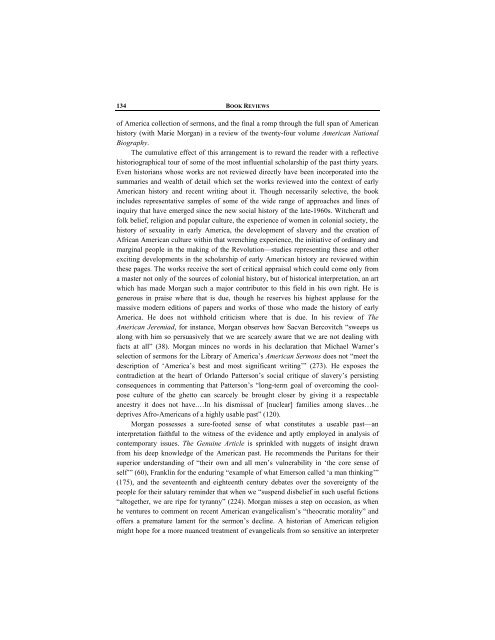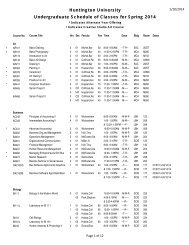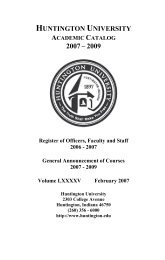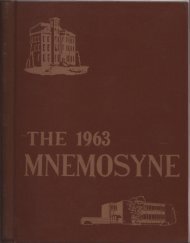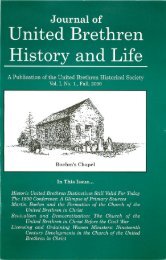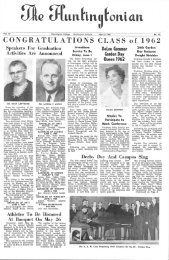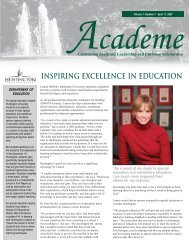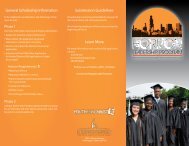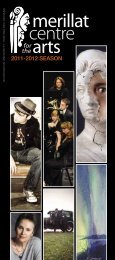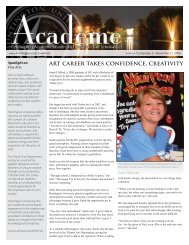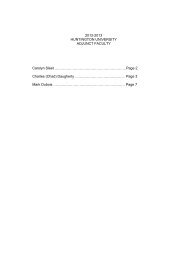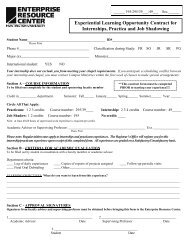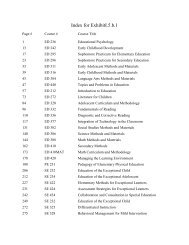Gillian Clark, Christianity and Roman Society - Huntington University
Gillian Clark, Christianity and Roman Society - Huntington University
Gillian Clark, Christianity and Roman Society - Huntington University
You also want an ePaper? Increase the reach of your titles
YUMPU automatically turns print PDFs into web optimized ePapers that Google loves.
134 BOOK REVIEWS<br />
of America collection of sermons, <strong>and</strong> the final a romp through the full span of American<br />
history (with Marie Morgan) in a review of the twenty-four volume American National<br />
Biography.<br />
The cumulative effect of this arrangement is to reward the reader with a reflective<br />
historiographical tour of some of the most influential scholarship of the past thirty years.<br />
Even historians whose works are not reviewed directly have been incorporated into the<br />
summaries <strong>and</strong> wealth of detail which set the works reviewed into the context of early<br />
American history <strong>and</strong> recent writing about it. Though necessarily selective, the book<br />
includes representative samples of some of the wide range of approaches <strong>and</strong> lines of<br />
inquiry that have emerged since the new social history of the late-1960s. Witchcraft <strong>and</strong><br />
folk belief, religion <strong>and</strong> popular culture, the experience of women in colonial society, the<br />
history of sexuality in early America, the development of slavery <strong>and</strong> the creation of<br />
African American culture within that wrenching experience, the initiative of ordinary <strong>and</strong><br />
marginal people in the making of the Revolution—studies representing these <strong>and</strong> other<br />
exciting developments in the scholarship of early American history are reviewed within<br />
these pages. The works receive the sort of critical appraisal which could come only from<br />
a master not only of the sources of colonial history, but of historical interpretation, an art<br />
which has made Morgan such a major contributor to this field in his own right. He is<br />
generous in praise where that is due, though he reserves his highest applause for the<br />
massive modern editions of papers <strong>and</strong> works of those who made the history of early<br />
America. He does not withhold criticism where that is due. In his review of The<br />
American Jeremiad, for instance, Morgan observes how Sacvan Bercovitch “sweeps us<br />
along with him so persuasively that we are scarcely aware that we are not dealing with<br />
facts at all” (38). Morgan minces no words in his declaration that Michael Warner’s<br />
selection of sermons for the Library of America’s American Sermons does not “meet the<br />
description of ‘America’s best <strong>and</strong> most significant writing’” (273). He exposes the<br />
contradiction at the heart of Orl<strong>and</strong>o Patterson’s social critique of slavery’s persisting<br />
consequences in commenting that Patterson’s “long-term goal of overcoming the coolpose<br />
culture of the ghetto can scarcely be brought closer by giving it a respectable<br />
ancestry it does not have.…In his dismissal of [nuclear] families among slaves…he<br />
deprives Afro-Americans of a highly usable past” (120).<br />
Morgan possesses a sure-footed sense of what constitutes a useable past—an<br />
interpretation faithful to the witness of the evidence <strong>and</strong> aptly employed in analysis of<br />
contemporary issues. The Genuine Article is sprinkled with nuggets of insight drawn<br />
from his deep knowledge of the American past. He recommends the Puritans for their<br />
superior underst<strong>and</strong>ing of “their own <strong>and</strong> all men’s vulnerability in ‘the core sense of<br />
self’” (60), Franklin for the enduring “example of what Emerson called ‘a man thinking’”<br />
(175), <strong>and</strong> the seventeenth <strong>and</strong> eighteenth century debates over the sovereignty of the<br />
people for their salutary reminder that when we “suspend disbelief in such useful fictions<br />
“altogether, we are ripe for tyranny” (224). Morgan misses a step on occasion, as when<br />
he ventures to comment on recent American evangelicalism’s “theocratic morality” <strong>and</strong><br />
offers a premature lament for the sermon’s decline. A historian of American religion<br />
might hope for a more nuanced treatment of evangelicals from so sensitive an interpreter


